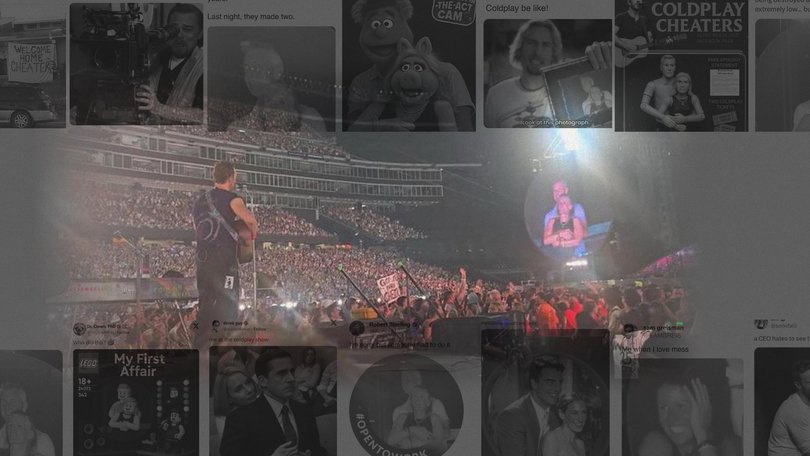AARON PATRICK: Coldplay kiss video proves that the internet can still change the world
AARON PATRICK: By making the world laugh at a couple caught in an embarrassing embrace, the internet demonstrated how great it is at sharing universal stories.

The internet was particularly good this week. The video clip of tech CEO Andy Byron and his human resources head, Kristin Cabot, caught in coupledom at a Coldplay concert reverberated around the world, becoming a moment of cultural unity.
The memes were mostly gentle, endearing and funny. Couples celebrated their love by pretending to be embarrassed at being caught in public together.
One man turned up at a sporting match prepared for exposure with a sign that read: “This is my wife.” The Philadelphia Phillies baseball team had their mascots, two long-nosed Sesame Street-like creatures, mimic Byron and Cabot’s physical shock at being caught in slapstick fashion.
Sign up to The Nightly's newsletters.
Get the first look at the digital newspaper, curated daily stories and breaking headlines delivered to your inbox.
By continuing you agree to our Terms and Privacy Policy.Others, using the creative power of artificial intelligence got political. On the Coldplay kiss cam, Jeffrey Epstein embraced Donald Trump, and Bill Clinton. One young couple demonstrated better options when caught on video at a public event. The best was to ignore the exposure.
“This story is absolutely unremarkable except in how it managed to combine almost everything it’s socially acceptable to hate brilliantly: HR, Coldplay, Cheaters, CEOs, millionaires,” one person tweeted.
“The chances of your marriages & careers being destroyed at a Coldplay Concert are extremely low… but never zero,” another wrote.

A genuine story
In a world drenched in slick entertainment and a deep pit of dark material online, it was refreshing to enjoy old-fashioned humour. For all the evils of social media enabled by the ubiquity of digital cameras, we can forget they allow experiences once rarely seen beyond those present to reach almost anyone.
In this case, the Coldplay concert in Boston encounter took off because, in a world awash with fakes, it was genuine.
Mr Byron and Ms Cabot were clearly enjoying the music and each other’s company. Their transformation from happiness to shame — and from success to humiliation — was almost instant.
While obviously devastating for them, there was little sympathy. A woman who appeared to be Mr Byron’s wife, Megan Kerrigan Byron, removed his surname from her social media accounts before deleting them altogether.
Lost job
Mr Byron lost his job at a small but well-funded software company that helps debug other software. Ms Cabot remains listed as the company’s chief people officer.
Property records indicate she is married to the chief executive of a spirits distiller and they bought a $3 million house last year in New Hampshire.
Neither Mr Byron nor Ms Cabot have appeared in public since their Coldplay experience.
No one in business these days is unaware of the danger of office affairs. When in play, they can create powerful alliances that undermine basic workplace fairness. When they break down, the damage can reverberate through the organisation.
‘Note to self’
Which is why, on the professional end of social media, LinkedIn, there is a lot of I-told-you-so commentary.
A communications consultant named Regina Phelps penned a “note to self”. “Do not do things in public that will embarrass you, make you lose your family and your job,” she wrote. “Basic principles.”
True words, although perhaps more self promotion than self reflection.
The couple’s employer, Astronomer, published a short note on Saturday announcing Mr Byron’s resignation. The business, which is owned by Salesforce, JP Morgan, Bain Capital and other big-name companies, proclaimed that such behaviour, entirely unspecified, to be unacceptable.
“Our leaders are expected to set the standard in both conduct and accountability, and recently, that standard was not met,” the company said.
Astronomer is not the first company where the CEO and the human resources director have hooked up. Notwithstanding Chris Martin’s non-helpful observation that “either they’re having an affair or they’re very shy,” it probably won’t be the last.
The company’s moral condemnation of its two employees feels like one of the most dishonest things written since the story broke. If the board had said Mr Byron was fired because he was too great an embarrassment, the internet would have believed it.
What the internet says matters. The online universe demonstrated this week that it can use laughter, as well as anger, shame and pity, to change the world.

